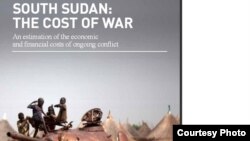South Sudan's conflict will cost the country billions of dollars and could push the young nation to become "a failed state, consumed by civil war" unless it is ended quickly, a report says.
"If the conflict continues for another one to five years, it will cost South Sudan between US $22.3 billion and $28 billion," warns the report by European analysts Frontier Economics; the University of Juba's Center for Peace and Development Studies (CPDS); and Ugandan non-profit, the Center for Conflict Resolution.
If the fighting is allowed to grind on for 20 years, the report says it will cost South Sudan a staggering $122 billion to $158 billion.
Human cost
The report calculates the direct economic costs of what it calls South Sudan's "senseless war" by estimating three major factors: the loss of productive assets and capital; the reduction in economic activity; and the shift from productive to non-productive activities in the country.
The authors of the report say the human costs of the conflict are incalculable.
"There can be no price tag on the suffering of South Sudan’s people from displacement, famine and death," the report says. "The human costs of conflict – death, hunger and disease – also have significant longer term economic impacts. Just taking the effects of hunger on labor productivity could mean a further $6 billion in lost GDP (gross domestic product) if the conflict were to last another five years."
Without a swift end to the fighting, South Sudan runs the risk of becoming a failed state, consumed by civil war. Worse still, it could become the epicentre of a full blown regional conflict.Cost of War report
Tens of thousands have been killed by the fighting, nearly two million have been displaced from their homes and 2.5 million people face food insecurity.
The economic impact of the crisis has spilled across borders, affecting neighboring countries and the broader international community.
If the conflict ended within one year rather than five, the international community could save an estimated $30 billion by reducing expenditure on peacekeeping and humanitarian assistance, the report says.
But, it warns, "Without a swift end to the fighting, South Sudan runs the risk of becoming a failed state, consumed by civil war. Worse still, it could become the epicentre of a full-blown regional conflict."
World's newest state
South Sudan is the world's newest nation. It is also one of the poorest, and, according to the World Bank, the most oil-dependent.
The country plunged into conflict in December 2013 when a political row between President Salva Kiir and his former vice president, Riek Machar, quickly escalated and spread around the country.
The fighting has been concentrated mainly in the two oil-producing states, Unity and Upper Nile, and in Jonglei state, which is sandwiched in between them. Oil production has fallen by half, from 340,000 barrels per day in 2011 to just under 170,000 barrels per day by February of this year.
Mr. Kiir and Machar have so far failed to reach a lasting peace deal. Talks to end the fighting mediated by regional bloc IGAD stalled early last month. The two sides' forces have clashed since then.









